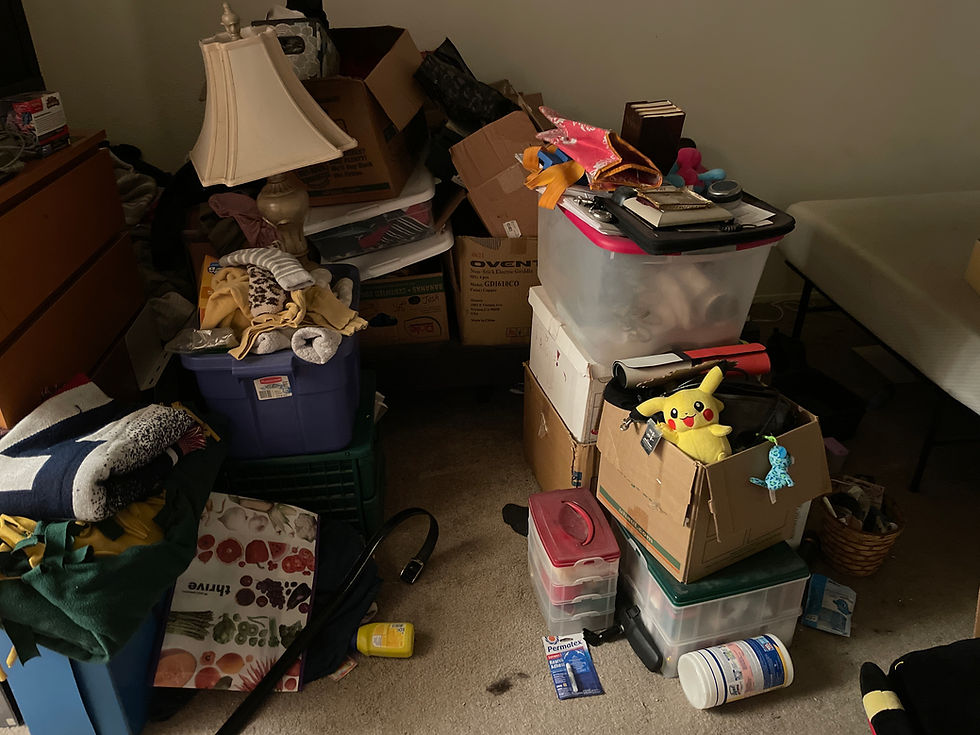Think OCD is being neat, tidy, and organized? Read this.
- Summer Contreras-Lemmon

- Oct 14, 2024
- 4 min read
I’m writing this post to share my story, to help paint a realistic picture of what recovery from OCD can look like, and to help dispel a common societal myth about people with OCD. It's also OCD Awareness Week, and despite the great efforts of the International OCD Foundation, other OCD charities, and countless advocates, there is still widspread misunderstanding and misinformation about OCD.
I am 31 years old this year. I have little professional work experience. At nearly every job I have had, I have had to either take a leave of absence or resign due to my mental health conditions. I avoid cooking and cleaning like the plague. All because of my disability, obsessive-compulsive disorder. I am only now starting to break free from it. OCD has stolen so much from me. Countless hours of what could have been healthy productivity in school because I was stuck trying to perfect my studying and homework. Time I could have spent meeting new people, trying new activities, and hanging out with peers because I was stuck doing mental compulsions. Money I lost because I thought it was necessary to attend a full four years at a university for what I thought was the “perfect” education instead of taking community college classes. Knowledge and experiences I could have gained in subjects and hobbies I loved because they had become “emotionally contaminated” with the fear I would fall back into my “unbelieving, sinful” former self. Relationships ruined because I endlessly sought reassurance from friends about the same questions.

My life has not been pretty. As I write this, dirty dishes are piled in the sink and on the countertops. There are even dirty dishes piled in boxes because there isn’t enough room in the sink for them. Piles of laundry sit in plastic garbage bags in my bedroom. Some of the laundry hasn’t been done in years. Yes, years! Sometimes I wear the same clothes because I can’t get myself to do a single load of laundry. There are several boxes of over five years of mostly unopened mail. All of this is because of my avoidance issues. I avoid because I want to do tasks perfectly. I avoid because I want to do my chores “just right”. I avoid because my mother used to do these chores for me and doing them myself reminds me that she is no longer here to help ease my anxiety.
This is what real OCD looks like. Not the “neat, tidy, and organized” caricature that is so often portrayed in the media. People with OCD can be very messy, and often are. OCD can take on many forms. Yes, some are excessively afraid of germs and wash their hands until they are raw. But others are excessively afraid of harming their loved ones and avoid things like kitchen knives, even butter knives. Some are afraid of harming children (even though they never would) to the point of refusing to be around their own children alone. Some are afraid of making the tiniest of mistakes and erase and re-erase their work until the paper wears down. Some are afraid of never having the perfect answer to life’s biggest questions and endlessly think about the meaning of life. Some doubt their romantic relationship and continually ask their partner if they love them. The list goes on.
Recovery from mental health conditions like OCD can take a long time. I have been trying to organize and clean my apartment ever since I moved in four years ago. I have made a ton of progress, and it has gradually gotten better, but the place still looks somewhat like a tornado ran through it. I still sometimes have the urge to confess “sins” which are not actually sins, like buying something small for myself and worrying that I was selfish and overspent my budget. I still sometimes overexplain myself. I still avoid dishes.
But I am not where I was last year, or the year before that, or three or even five years ago. Recovery is not a linear process. Often, it is two steps forward, three steps backward, another step forward, another step back, and so on. What’s important is the trajectory of your recovery, and this applies to not just OCD but to other mental health conditions as well such as bipolar disorder, eating disorders, and addiction.
OCD will likely be a lifelong battle for me. But the prognosis is positive. OCD has an effective, evidence-based treatment called exposure and response prevention, where you deliberately trigger your obsessive fears in a hierarchal way and refrain from doing compulsions. It’s a challenging treatment involving a lot of uncomfortable emotions, but ERP works in most cases, often in conjunction with psychiatric medications. OCD can be managed.
To anyone reading this who has OCD, there is hope. You can get better, as I have, even if it feels slow sometimes. To anyone reading this who does not have OCD, you probably know someone who has it, as about 1 in 100 adults has OCD. And I want you to understand that OCD is a complex disorder that is not a quirk, and does not involve being “neat, tidy, and organized.”
Together, we can help eradicate stigma about OCD and other mental health conditions and help lead others to effective, evidence-based treatment. Thank you for reading!







Comments